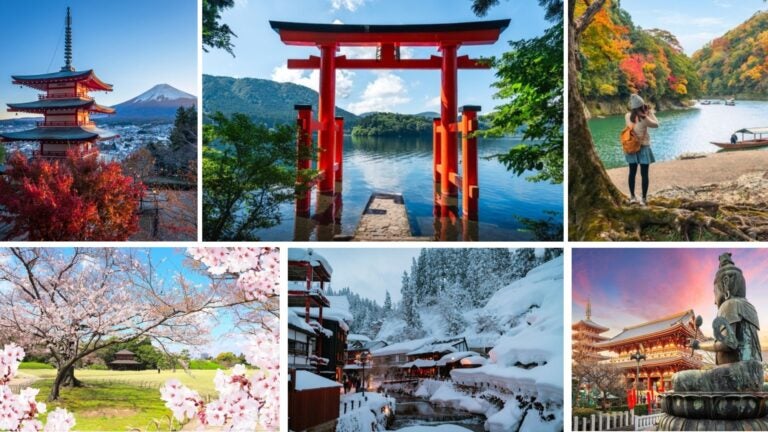Live in Japan: Advantages, disadvantages & costs
The Land of the Rising Sun is a great place to settle down for good or for a while - find out all about what it's like to live in Japan!
Moving to Japan isn’t just relocating, it’s stepping into a culture where ancient traditions blend seamlessly with cutting-edge technology. Picture serene temples next to towering skyscrapers, spotless streets, trains that run like clockwork, and a deep-rooted sense of respect in everyday life. But what’s it really like to live in Japan as a foreigner? Is it as expensive as people say? And how do things like healthcare, safety, and public services work if you don’t speak the language?
You’re probably asking yourself all these questions. That’s why we’ve put together a complete guide for anyone thinking about moving to Japan, whether for a short stay or a long-term move. We’ll take a look at what life’s really like there, the perks of living in the Land of the Rising Sun, and the challenges foreigners might face.
Before we dive in, here’s a fun fact: Japan has one of the highest life expectancies in the world, over 84 years on average. What’s their secret? A mix of healthy eating, excellent healthcare, and strong social structure. Safe to say, quality of life plays a big role. Let’s take a closer look.
What is the quality of life like in Japan?
Japan consistently ranks among the countries with the highest quality of life. With its efficient public services, low crime rates, top-notch healthcare, and strong sense of social order, it’s no surprise that it’s a top choice for professionals, students, and digital nomads.
Below, we analyze the main factors that affect the quality of life in Japan.
1- Japanese education system
Japan’s education system is known for its high standards, strong discipline, and impressive results. According to the OECD’s PISA rankings, Japan consistently ranks among the top five countries in math, reading, and science. Schooling is mandatory from age six to fifteen, and both public and private schools offer excellent academic quality.
Public schools in Japan are free but mostly follow the local curriculum in Japanese. That’s why many foreign families opt for international schools, which offer instruction in English, French, German, or Spanish, and follow programs like the IB or the British curriculum.
If you are moving to Japan with your whole family and need to send your children to school, this information may help you:
- Public schools: Free of charge, but you pay for materials, uniform and lunchroom (about ¥50,000 per year, approximately $320).
- Japanese private schools: Between ¥600,000 and ¥1,000,000 per year ($3,800 to $6,300).
- International schools: ¥1,500,000 to ¥2,500,000 per year ($9,500 to $16,000), depending on the level and city.
When it comes to higher education, Japan has a lot to offer international students. Many public and private universities provide degree programs in English, and scholarships like the MEXT (Monbukagakusho) can really help ease the financial burden. On average, here’s what you can expect to pay per year:
- Public universities: ¥500,000 to ¥700,000 per year ($3,200 to $4,500).
- Private universities: From ¥800,000 to ¥2,000,000 per year ($5,000 to $12,500), depending on the area.
On top of tuition, you’ll also need to factor in enrollment fees and study materials. The good news? If you land a scholarship, it often covers part or all of these costs, and in many cases, housing too, which is usually the biggest expense when living in Japan.

2- Safety and social norms
Japan is known for being incredibly safe. In fact, it regularly ranks among the top 10 safest countries globally. Once you’re living there, you’ll quickly see kids commuting alone, lost wallets getting returned, and people dozing off on public transport without a second thought. It’s a level of everyday trust and safety that’s hard to find elsewhere.
Respect and good manners are a big part of daily life in Japan. From early on, people are taught to value social harmony, take care of shared spaces, and be mindful of those around them.
3- Cost of living in Japan
Japan is the world’s third-largest economy, with a strong job market and plenty of opportunities in fields like tech, healthcare, education, engineering, international trade, and culinary arts.
Average monthly salaries in Japan range from ¥300,000 to ¥400,000 ($2,000 to $2,700), which is generally enough for a comfortable lifestyle outside the major cities. That said, places like Tokyo and Osaka are among the most expensive cities in the world, so daily expenses there tend to be higher. For instance, rent in Tokyo can range from $1,200 to $2,500 for a one-bedroom apartment. In Osaka and Kyoto, it’s usually between $900 and $1,800, while in cities like Fukuoka, Sapporo, or Nagoya, you might pay anywhere from $700 to $1,500.
So if you’re working with a tighter budget, you might want to consider settling in a smaller city like Fukuoka or Sapporo. The cost of living is noticeably lower, but you’ll still enjoy a great quality of life.
4- Job market in Japan: Opportunities for foreigners
Japan offers a stable and well-paying job market, especially in fields like tech, healthcare, education, and engineering. While entry-level or hourly wages start at around ¥1,000 ($6.30), most full-time positions pay between ¥300,000 and ¥400,000 per month ($2,000–2,700). If you’ve got experience or specialized skills, salaries can easily go beyond ¥500,000 (over $3,200). Just keep in mind: competition is high, and companies expect a strong work ethic.
Japan has traditionally been a tough job market for foreigners, but that’s been shifting in recent years. With an aging population and a shrinking workforce, the country is opening its doors to international talent. Some of the most in-demand and best-paying roles include:
- Engineering (civil, mechanical, electronics, automotive)
- Technology and information technology (programmers, developers, cybersecurity, AI)
- Language training, especially English
- Finance and international trade
- Scientific research and medicine
Since 2019, Japan has introduced new types of work visas aimed at filling jobs in sectors like nursing, construction, hospitality, agriculture, and elder care. There’s even a visa option now for digital nomads!
In Japan, work often means long hours and a strong sense of duty to your company. That said, it also offers security and clear structure. The good news is that some sectors, especially tech and marketing, are starting to embrace remote and hybrid setups, bringing a more modern, flexible approach to the traditional work culture.
Another key point to keep in mind is the language. While English might be enough in fields like education, tech, or research, jobs in areas like administration, sales, or healthcare typically require Japanese. The upside? Learning the language once you’re in Japan is very doable. Many local governments offer free or low-cost Japanese classes for foreign residents. If you’re thinking about studying Japanese while living there, here’s a practical guide that could come in handy.

5- Health system in Japan
Japan’s healthcare system is known for being highly advanced and efficient. It consistently ranks near the top globally for quality of care, with easy access to state-of-the-art hospitals, expert doctors, and the latest medical technology.
In Japan, all residents must join the National Health Insurance program. This plan covers most medical costs, from doctor visits and hospital stays to medications and dental care. Fees vary based on your income; for instance, a non-working student might pay about ¥20,000 a year ($130). Many foreigners also opt for extra private insurance to get more extensive coverage.
Regarding language, many large hospitals, especially in Tokyo, Osaka or Kyoto, have English-speaking staff, which is a great advantage, but it can be a challenge in rural areas.
6- Food, sports and healthy habits
Earlier, we mentioned that people in Japan enjoy one of the longest life expectancies worldwide. In places like Okinawa, known as “blue zones,” many live past 100 years, staying healthy well into old age.
The keys to a longer, healthier life in Japan include eating well, staying physically active, managing stress, and being part of a close-knit community—values that are sometimes overlooked in Western societies.
Japanese cuisine centers around staples like rice, vegetables, fish, and green tea, providing a balanced mix of carbs, protein, vitamins, minerals, and antioxidants. With minimal use of oils, sugars, and processed foods, it’s considered one of the healthiest diets worldwide, according to Harvard School of Public Health. On top of that, activities like walking, biking, tai chi, or morning exercises in parks are common daily habits, especially among older adults.
On top of that, this lifestyle is supported by the environment: well-maintained parks, punctual trains, quiet neighborhoods, and fresh food available at every supermarket.

7- Internet connectivity and digital life
Japan stands out worldwide for its top-notch connectivity. Most of the country has access to fiber optic internet, with average speeds over 120 Mbps. On top of that, 5G networks are expanding rapidly thanks to strong support and investment from both the government and private sector.
Japan stands out in automation and Internet of Things (IoT), with smart homes and robots assisting in stores and transit hubs, making technology a natural part of daily life. Even toilets are connected to the internet.
Even though Japan is highly connected, there’s one important thing to keep in mind: public WiFi is quite limited. Both locals and visitors usually rely on other options to stay online. One handy choice is Holafly’s monthly plans, which offer unlimited data you can share across multiple devices. This way, you can use maps, translators, transport apps, and stay connected no matter where you are—even outside Japan—since their eSIM works worldwide.
Important: If you are a frequent traveler and want to stay connected without worrying about expensive roaming or looking for a new SIM at every destination, Holafly’s subscription plans are for you. With a single eSIM, enjoy internet in more than 170 countries for a fixed price and no surprises on your bill. Travel without limits and connect easily and securely! 🚀🌍

What are the advantages and challenges of living in Japan?
Moving to Japan means immersing yourself in a unique blend of tradition and modern life, where everything runs smoothly and safely. But like anywhere new, it comes with its own challenges, especially when you’re just starting out. To help you get a real sense of what to expect, keep reading:
Advantages of living in Japan
- It is one of the safest societies in the world: Japan stands out for its incredibly low crime rate. You can feel safe walking alone at night, leave your bike unlocked, or even get lost items returned to you in public places. This strong sense of trust is visible in everyday life.
- Efficient, clean and timely public transportation: Traveling around Japan is incredibly convenient. The shinkansen bullet trains cover the whole country, and urban transit systems are known for their punctuality, cleanliness, and dependability. Even in smaller towns, you can count on regular and efficient transportation.
- There is a culture of respect and courtesy: From greetings to sharing public spaces, daily life in Japan is guided by strong social customs that focus on everyone’s well-being. The quietness on the subway, spotless streets, and polite interactions all come together to create a truly pleasant urban experience.
- Public health is of quality and prices are affordable with insurance: Japan’s healthcare system blends advanced technology, efficiency, and a respectful approach. Thanks to the national health insurance, you can access top-quality clinics and hospitals while paying only a small portion of the actual cost.
- Healthy lifestyle: The Japanese diet focuses on fish, rice, vegetables, and green tea, with very little saturated fat. On top of that, walking, cycling, or doing light exercises in the park is common, especially among older adults.
- High-speed Internet and good digital infrastructure: Japan offers some of the best connectivity in the world. Whether you’re at home, in a café, or a public spot, the internet is fast and perfect for remote work.
- A country full of attractions to discover all year round: Living in Japan means having ancient temples, samurai castles, futuristic cities, subtropical beaches, snowy mountains, and ever-changing nature right at your doorstep. From cherry blossoms in spring to lively summer festivals, there’s always something new to discover and enjoy.

Challenges of living in Japan
- Language can be a barrier to daily life: While many people in tourism and international companies speak some English, daily life still requires Japanese. So, learning the language will really help, but keep in mind it takes time to get comfortable.
- Integrating into society can take years: Japanese people are polite but often keep a certain distance, so making close friends can take time. Many expats feel lonely at first, especially if they don’t speak the language or aren’t part of an international circle.
- In large cities the cost of living is high: Tokyo, Osaka, and Yokohama can be pricey, especially when it comes to housing. A studio apartment in a convenient area often costs over $1,000 a month. Eating out is affordable sometimes, but doing it regularly can quickly add up.
- Work culture is demanding: While things are shifting, many Japanese companies still expect long-term loyalty and strong dedication. The long hours and rigid schedules can be tough, especially if you’re used to a more laid-back work culture.
- Weather conditions can be intense in some regions: Japan’s summers can be hot, often reaching over 35°C, while winters get pretty cold in northern and mountainous areas. Natural events like earthquakes, typhoons, and tsunamis are part of life there, but the country is well-equipped to handle them.
Frequently asked questions about living in Japan
Definitely doable, especially in big cities like Tokyo, Osaka, or Kyoto where many services cater to foreigners. But outside the main tourist or international areas, not knowing Japanese can make renting, handling paperwork, or accessing healthcare more challenging. Having some basic Japanese really helps, and there are plenty of affordable ways to learn it while you’re there.
Japan provides various visa options including work, student, spouse, and entrepreneur visas, as well as special categories for highly skilled professionals and workers in industries facing labor shortages. Digital nomads can also apply for a visa that lets them work remotely for clients abroad.
You can get by in Japan’s smaller cities on around $2,000 a month with a modest lifestyle. But if you’re aiming to live in Tokyo or Osaka, expect your budget to start at about $3,000 to cover rent, food, utilities, insurance, and transportation.
The Japanese government requires people living in Japan to pay income tax, consumption tax, property tax, and contribute to social security, among other obligations. The amount varies depending on your income level and where you live.





 Language
Language 


















 No results found
No results found



